Like the earlier 13 Tzameti [DVD] [2006], Temur and Gela Babluani's Legacy aka L'Héritage is not much more than another modern-day traveller's tale, yet despite having a less sensational and commercially exploitable premise, it's rather more satisfying despite it's slightness. Even at some 75 minutes, it's a leisurely paced film, initially following a trio of French backpackers en route to a castle one of them has inherited in Georgia with their translator and doing all the things tourists usually do: filming everything, getting their camera stolen, haggling with locals and ending up on a long cross-country bus trip. It's here that the plot starts to twist as an old man and his grandson get on with an empty coffin. The coffin is for the old man, who is travelling to an `enemy' village where he'll be killed to finally put an end to a 40 year vendetta, sparking the curiosity of the foreigners with predictably catastrophic results. It probably would take too much to guess how things are going to turn out, but taking its pacing from the journey itself, events gradually unfold and reveal themselves with surprising naturalism: it's more an observation piece than the melodrama the plot implies or the surreal comedy the opening and closing music threatens. It doesn't add up to a great deal, but it manages to cast a spell of its own, playing its absurdity straight and benefiting from finely underplayed performances, especially Pascal Bongard as the wary but compliant translator and Augustin Legrand as a mute trader.
Revolver's UK DVD is completely extras-free, but does boast a decent 2.35:1 transfer.
A satisfying modern day traveller's tale
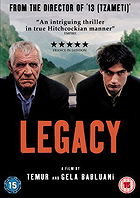 Posted : 12 years, 4 months ago on 4 February 2013 02:42
(A review of Legacy)
Posted : 12 years, 4 months ago on 4 February 2013 02:42
(A review of Legacy) 0 comments, Reply to this entry
0 comments, Reply to this entry
Not great, but certainly good
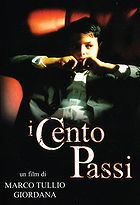 Posted : 12 years, 4 months ago on 4 February 2013 02:39
(A review of One Hundred Steps)
Posted : 12 years, 4 months ago on 4 February 2013 02:39
(A review of One Hundred Steps)I Cento Passi/The Hundred Steps never travelled much farther than Italy despite its local success. On one level, it's not difficult to see why. One of many Italian/Sicilian films about victims of the Mafia, it's likely to have less resonance for foreign audiences unfamiliar with a story that was even overshadowed in Sicily at the time because it happened at the same time as Aldo Moro's kidnapping and murder. Aside from the killings at the beginning and end of the film, we never see the Mafia's work firsthand, the film relying on their silent presence as a fact of life (the only scene of genuine intimidation involves nothing more than playing back a tape of a radio broadcast). While this is certainly true to life, it means that the vast majority of the film is taken up with its martyred hero as he joins the communist party before breaking away with a group of likeminded students to start a pirate radio station attacking the Mafia. To its credit, the film doesn't flinch on his self-importance, the immaturity of his tactics or his selfishness, and nor does it ignore the fact that his broadcasts relied more on hearsay and childish innuendo than documented fact - as the local capo not unreasonably points out in one of the film's more powerful scenes. However, you do find yourself wondering at times where the film is going and when it will get there, but when it does it packs an emotional punch. Unlike many recent Italian `political' films such as Placido Rizzotto, it's not so in awe of Rosi and his peers - if anything, the influence here is almost American Graffiti - that it ends up a lifefless I'm-not-worthy imitation, and it boasts some excellent supporting performances, particularly from Luigi Maria Burruano and Tony Sperandeo. Not great, but certainly good.
 0 comments, Reply to this entry
0 comments, Reply to this entry
Zorba the Greek (1964) review
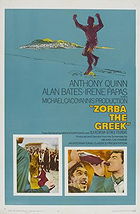 Posted : 12 years, 4 months ago on 4 February 2013 02:35
(A review of Zorba the Greek (1964))
Posted : 12 years, 4 months ago on 4 February 2013 02:35
(A review of Zorba the Greek (1964))Despite its somewhat undeserved modern reputation as a bit of lightweight tourist bait, Zorba the Greek turns out to be a surprisingly dark and anarchic film - not so surprising when you consider that it's based on a novel by Nikos Katzanzakis, who also wrote The Last Temptation of Christ. Indeed, the film originally began with Anthony Quinn playing Zeus (or at least Zeus as Zorba sees him) in a deliberately theatrically artificial heaven in a prologue that can be found in the extras on he US DVD and Blu-ray editions (but not the less fortunate Region 2 PAL editions).
It certainly paints a less than flattering portrait of Cretan village life. One Sunday the villagers leave the church to harry and then kill a woman they blame for a suicide, and when ex-prostitute Lila Kedrova lies dying they cannot even wait for her to stop breathing to loot her hotel. Functioning like some leaderless medieval fiefdom in thrall to machismo and misogyny, it is as far from a good commercial for the Cretan tourist Board as you can imagine.
Similarly, Anthony Quinn's performance in the title role is more layered than its many parodies over the years would lead you to expect. A loser with a gift for life who inveigles his sway into working for Alan Bates' excellently underplayed half-English observer of life who has come to make a go of his father's mine, there's a genuine sense of laughter in the face of death and despair in his performance. More low-key than you would expect, it is all perfectly underlined by Mikos Theodorakis' surprisingly varied and versatile score and Walter Lassally's Oscar-winning cinematography.
While, typically for Fox, the European PAL DVD releases of the film come up short on extras, their region-free US Blu-ray carries over all the extras from their two-sided US DVD release, and it's an impressive bunch: audio commentary by director Michael Cacoyannis and Nikos Katzanzakis expert Demetrios Liappas, the alternate opening sequence, documentary Anthony Quinn - A Lust for Life, 2 Movietone News extracts, stills gallery, TV spot; teaser trailer and full trailer (they're not all listed on the packaging but are all present and correct on the disc itself).
It certainly paints a less than flattering portrait of Cretan village life. One Sunday the villagers leave the church to harry and then kill a woman they blame for a suicide, and when ex-prostitute Lila Kedrova lies dying they cannot even wait for her to stop breathing to loot her hotel. Functioning like some leaderless medieval fiefdom in thrall to machismo and misogyny, it is as far from a good commercial for the Cretan tourist Board as you can imagine.
Similarly, Anthony Quinn's performance in the title role is more layered than its many parodies over the years would lead you to expect. A loser with a gift for life who inveigles his sway into working for Alan Bates' excellently underplayed half-English observer of life who has come to make a go of his father's mine, there's a genuine sense of laughter in the face of death and despair in his performance. More low-key than you would expect, it is all perfectly underlined by Mikos Theodorakis' surprisingly varied and versatile score and Walter Lassally's Oscar-winning cinematography.
While, typically for Fox, the European PAL DVD releases of the film come up short on extras, their region-free US Blu-ray carries over all the extras from their two-sided US DVD release, and it's an impressive bunch: audio commentary by director Michael Cacoyannis and Nikos Katzanzakis expert Demetrios Liappas, the alternate opening sequence, documentary Anthony Quinn - A Lust for Life, 2 Movietone News extracts, stills gallery, TV spot; teaser trailer and full trailer (they're not all listed on the packaging but are all present and correct on the disc itself).
 0 comments, Reply to this entry
0 comments, Reply to this entry
The Savage Innocents (1960) review
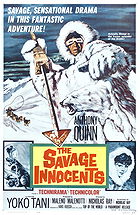 Posted : 12 years, 4 months ago on 4 February 2013 02:33
(A review of The Savage Innocents (1960))
Posted : 12 years, 4 months ago on 4 February 2013 02:33
(A review of The Savage Innocents (1960))A throwback to that briefly popular 20s-30s anthropological genre of films dealing with the Inuit lifestyle like Nanook of the North and Men of Two Worlds, Nicholas Ray's The Savage Innocents seems caught between reconstructions of daily life complete with explanatory narration and a culture clash drama when two incompatible moralities meet with potentially disastrous consequences. At the time the film's rather innocent portrayal of wife-swapping caused it no end of censorship troubles but unfortunately from a modern perspective the film is troubling in different ways: at times it's hard to shake the feeling that the film is guilty of unintentionally patronising the Inuit characters, played by a mixture of Mexican (Anthony Quinn), Japanese (Yoko Tani), Chinese-American (Anna May Wong) and even British actors (Lee Montague) as childishly happy and incapable of grasping abstract concepts or other cultures' different morality, while the scenes where polar bears are killed on camera are out of step in a time when they're regarded as endangered species rather than a source of food. If it over-romanticises its hero as a somewhat unconvincingly `uncorrupted' savage - and it takes a big leap of faith to believe he lives so far north he'd never even heard of a gun let alone seen one - in its favour, it's non-judgmental, ultimately coming to the conclusion that the best thing for both Inuits and whites is to keep as far away from reach other as possible.
It's problematic in other ways as well. While the location footage is impressive, the studio work and some terrible back projection and green screen work are particularly obvious while the dubbing of one of the actors in a small but crucial supporting role is especially jarring since a couple of years later he'd become a major star (again starring opposite Anthony Quinn) playing Lawrence of Arabia. Earning its place in popular music trivia after its theatre marquee was the inspiration for Bob Dylan's Quinn the Eskimo ("You ain't seen nothin' like the Mighty Quinn"), it's certainly a film you have to make a lot of allowances for, yet somehow it still manages to hold the interest and exert some fascination in its celebration of a (not terribly accurately portrayed) philosophy and way of life most of its audience could never begin to understand even though its ambitions are never fully realised.
Because of rights problems, it's become particularly hard to find in its uncut form - Masters of Cinema did release a strikingly good 2.35:1 widescreen transfer of the uncut version with audio commentary and stills gallery, but that was pulled from release for legal reasons (though you can still find the odd copy second hand), while the subsequent UK release by Prism was an atrocious fullframe transfer of the cut US release print.
It's problematic in other ways as well. While the location footage is impressive, the studio work and some terrible back projection and green screen work are particularly obvious while the dubbing of one of the actors in a small but crucial supporting role is especially jarring since a couple of years later he'd become a major star (again starring opposite Anthony Quinn) playing Lawrence of Arabia. Earning its place in popular music trivia after its theatre marquee was the inspiration for Bob Dylan's Quinn the Eskimo ("You ain't seen nothin' like the Mighty Quinn"), it's certainly a film you have to make a lot of allowances for, yet somehow it still manages to hold the interest and exert some fascination in its celebration of a (not terribly accurately portrayed) philosophy and way of life most of its audience could never begin to understand even though its ambitions are never fully realised.
Because of rights problems, it's become particularly hard to find in its uncut form - Masters of Cinema did release a strikingly good 2.35:1 widescreen transfer of the uncut version with audio commentary and stills gallery, but that was pulled from release for legal reasons (though you can still find the odd copy second hand), while the subsequent UK release by Prism was an atrocious fullframe transfer of the cut US release print.
 0 comments, Reply to this entry
0 comments, Reply to this entry
Surprisingly well crafted and satisfying
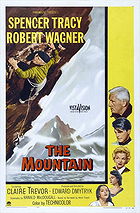 Posted : 12 years, 4 months ago on 4 February 2013 02:30
(A review of The Mountain)
Posted : 12 years, 4 months ago on 4 February 2013 02:30
(A review of The Mountain)"I haven't climbed in ten years. That in itself would be enough if a man gets old. And besides, my hands are not as strong as they once were - and the mountain is against me. But all that there is, there's one thing more, the most important thing. It isn't right! Isn't there anything inside you that tells you it isn't right? You want me to take you up to the top of the mountain in the sight of God so you can pick the pockets of dead people?"
MGM must have been furious when, after throwing the production of Tribute to a Bad Man into chaos when he pulled out after a few days shooting on health grounds, citing the location's high altitude as the reason he couldn't finish the picture, Spencer Tracy went on to make The Mountain for Paramount instead. Not that it's Tracy doing any of the real climbing in this surprisingly gripping drama that sees his simple mountain guide returning against his will to a mountain that doesn't want him and has tried to kill him three times already to help Robert Wagner loot the bodies of the victims of a plane crash at the peak.
At first Tracy seems badly miscast and showing his age and then some as Robert Wagner's older - very much older - brother. Only 56, just a couple of years after playing Wagner's father in Broken Lance, his hell raising years had caught up with him enough by then to make him look old enough to play his grandfather here. It doesn't help that the part is clearly written for a man a good ten years younger, rendering him less a simple man than an unconvincingly naïve one in his scenes with thinly-drawn romantic interest Claire Trevor, brushing off his dialogue as if he doesn't believe it either while she effortlessly runs rings around him. But he's on firmer ground when his manipulative brother's desperation to get enough money to get out of their picturesque but poor village makes him cast aside his moral qualms and better judgement.
Mountain movies tend to work better when there's some antagonism between the climbers, whether it's Glenn Ford's easygoing ex-G.I. locking horns with Lloyd Bridges' Nazi fanaticism in The White Tower, Sean Connery and Lambert Wilson's romantic rivalry in Five Days One Summer or Clint Eastwood trying to work out which of his fellow climbers is trying to kill him in The Eiger Sanction, and that's very much the case here. It's not too difficult to predict the plot developments, but Edward Dmytryk's direction and the cast underplay it just enough to avoid slipping into melodrama until the finale, while the special effects are surprisingly good, the VistaVision system allowing a much higher quality of backprojection that blends in very well in most scenes. It doesn't have the sheer elemental grandeur and visual poetry of Arnold Fanck's German `berg' films with Leni Riefenstahl, but it does have a very impressive sense of scale thanks to an excellent eye for locations. There's a constant contrast between Franz Planer's vivid color photography and the beauty of the surroundings with the cynical characters and their dark motives. Here it's often the bright sunlight that reveals not just Wagner's callousness but even that of a tourist and his attractive mistress or the initial self-important throwaway slights of the `official' rescue expedition.
As usual in this kind of film (or at least those of the American variety) the women have little to do: Claire Trevor's widow waits for Tracy to marry her, playgirl Barbara Darrow briefly uses Robert Wagner for some holiday amusement and Anna Kashfi manages to have a role that's both pivotal and thankless. But the male supporting cast, including E.G.Marshall, William Demarest and Richard Arlen, don't have that much to do either in roles that are intended to set the stage for the two stars and their resentment and disappointment. Ultimately it's very much a two-hander, but Tracy and Wagner work well enough together to paper over some of the thinness of the characters, holding their own against the film's third star, the stunning scenery and locations. These look suitably epic and stunning on Olive's extras-free but also region-free widescreen Blu-ray release that does a pretty good job of recreating VistaVision's self-proclaimed `motion picture hi-fidelity.' There is some slight colour fluctuation in the chimney sequence but not enough to detract from an impressive transfer of a largely forgotten film that, while not hugely ambitious, is surprisingly well crafted and satisfying.
MGM must have been furious when, after throwing the production of Tribute to a Bad Man into chaos when he pulled out after a few days shooting on health grounds, citing the location's high altitude as the reason he couldn't finish the picture, Spencer Tracy went on to make The Mountain for Paramount instead. Not that it's Tracy doing any of the real climbing in this surprisingly gripping drama that sees his simple mountain guide returning against his will to a mountain that doesn't want him and has tried to kill him three times already to help Robert Wagner loot the bodies of the victims of a plane crash at the peak.
At first Tracy seems badly miscast and showing his age and then some as Robert Wagner's older - very much older - brother. Only 56, just a couple of years after playing Wagner's father in Broken Lance, his hell raising years had caught up with him enough by then to make him look old enough to play his grandfather here. It doesn't help that the part is clearly written for a man a good ten years younger, rendering him less a simple man than an unconvincingly naïve one in his scenes with thinly-drawn romantic interest Claire Trevor, brushing off his dialogue as if he doesn't believe it either while she effortlessly runs rings around him. But he's on firmer ground when his manipulative brother's desperation to get enough money to get out of their picturesque but poor village makes him cast aside his moral qualms and better judgement.
Mountain movies tend to work better when there's some antagonism between the climbers, whether it's Glenn Ford's easygoing ex-G.I. locking horns with Lloyd Bridges' Nazi fanaticism in The White Tower, Sean Connery and Lambert Wilson's romantic rivalry in Five Days One Summer or Clint Eastwood trying to work out which of his fellow climbers is trying to kill him in The Eiger Sanction, and that's very much the case here. It's not too difficult to predict the plot developments, but Edward Dmytryk's direction and the cast underplay it just enough to avoid slipping into melodrama until the finale, while the special effects are surprisingly good, the VistaVision system allowing a much higher quality of backprojection that blends in very well in most scenes. It doesn't have the sheer elemental grandeur and visual poetry of Arnold Fanck's German `berg' films with Leni Riefenstahl, but it does have a very impressive sense of scale thanks to an excellent eye for locations. There's a constant contrast between Franz Planer's vivid color photography and the beauty of the surroundings with the cynical characters and their dark motives. Here it's often the bright sunlight that reveals not just Wagner's callousness but even that of a tourist and his attractive mistress or the initial self-important throwaway slights of the `official' rescue expedition.
As usual in this kind of film (or at least those of the American variety) the women have little to do: Claire Trevor's widow waits for Tracy to marry her, playgirl Barbara Darrow briefly uses Robert Wagner for some holiday amusement and Anna Kashfi manages to have a role that's both pivotal and thankless. But the male supporting cast, including E.G.Marshall, William Demarest and Richard Arlen, don't have that much to do either in roles that are intended to set the stage for the two stars and their resentment and disappointment. Ultimately it's very much a two-hander, but Tracy and Wagner work well enough together to paper over some of the thinness of the characters, holding their own against the film's third star, the stunning scenery and locations. These look suitably epic and stunning on Olive's extras-free but also region-free widescreen Blu-ray release that does a pretty good job of recreating VistaVision's self-proclaimed `motion picture hi-fidelity.' There is some slight colour fluctuation in the chimney sequence but not enough to detract from an impressive transfer of a largely forgotten film that, while not hugely ambitious, is surprisingly well crafted and satisfying.
 0 comments, Reply to this entry
0 comments, Reply to this entry
Third Man on the Mountain review
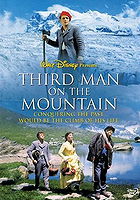 Posted : 12 years, 4 months ago on 4 February 2013 02:29
(A review of Third Man on the Mountain)
Posted : 12 years, 4 months ago on 4 February 2013 02:29
(A review of Third Man on the Mountain)It may not tap into the primal majesty of Arnold Fanck and Leni Riefenstahl's once-hugely popular German `berg' films of the Thirties, but Disney's 1959 live-action feature Third Man on the Mountain is a rather splendid family-friendly adventure that benefits from a stronger story and characterisation. Not that either are particularly complex: James MacArthur is the son of a legendary guide who died trying to save a climber on the deadly Citadel, the only mountain in the area that has never been climbed and which kills most of those who make the attempt. Dreaming of becoming a guide himself, he's relegated to the kitchen of the local hotel that has done very nicely out of the fame his father's death has brought the village, his uncle (James Donald) determined to keep firmly down on the ground for his mother's sake while girlfriend Janet Munro and former guide Laurence Naismith know that's not going to happen. Things start looking up when he saves the life of Michael Rennie's legendary climber, who's planning his own assault on the Citadel, but none of the town's guides will go with him...
It's the kind of well-crafted old-fashioned storytelling that still holds up very well indeed, with an appealing cast, some gorgeous Technicolor photography of some stunning Swiss locations and some impressive footage on the mountains themselves that isn't over-reliant on Peter Ellenshaw's occasional matte painting. There are plenty of familiar faces in the cast, from Herbert Lom's reliably bad tempered guide from a rival village, locals Ferdy Mayne and a very recognisable but unbilled Roger Delgado (the Master from Doctor Who) and even an unbilled cameo for MacArthur's mother Helen Hayes. Only the usually reliable James Donald, who specialised in playing the understated voice of reason in tales of obsession like Bridge on the River Kwai, is a bit more awkward playing outside his comfort zone as the stern, occasionally belligerent uncle, but it's more a performance that occasionally wavers in the wrong direction before righting itself than one that hurts the picture. It's still hugely entertaining, so it's little surprise that Disney would reunite MacArthur, Munro and Annakin for Swiss Family Robinson [DVD] [1960] [Region 1] [US Import] [NTSC] the following year.
It's just a shame that the barebones NTSC Region 1 DVD release didn't get remastered - it's not a disastrous transfer but it looks like a simple port of the old video transfer which is mostly adequate but lacks the kind of extra detail that would give it a bit more bite. No extras either, despite Disney devoting an episode of his Disneyland TV show to its production that could easily have been included.
It's the kind of well-crafted old-fashioned storytelling that still holds up very well indeed, with an appealing cast, some gorgeous Technicolor photography of some stunning Swiss locations and some impressive footage on the mountains themselves that isn't over-reliant on Peter Ellenshaw's occasional matte painting. There are plenty of familiar faces in the cast, from Herbert Lom's reliably bad tempered guide from a rival village, locals Ferdy Mayne and a very recognisable but unbilled Roger Delgado (the Master from Doctor Who) and even an unbilled cameo for MacArthur's mother Helen Hayes. Only the usually reliable James Donald, who specialised in playing the understated voice of reason in tales of obsession like Bridge on the River Kwai, is a bit more awkward playing outside his comfort zone as the stern, occasionally belligerent uncle, but it's more a performance that occasionally wavers in the wrong direction before righting itself than one that hurts the picture. It's still hugely entertaining, so it's little surprise that Disney would reunite MacArthur, Munro and Annakin for Swiss Family Robinson [DVD] [1960] [Region 1] [US Import] [NTSC] the following year.
It's just a shame that the barebones NTSC Region 1 DVD release didn't get remastered - it's not a disastrous transfer but it looks like a simple port of the old video transfer which is mostly adequate but lacks the kind of extra detail that would give it a bit more bite. No extras either, despite Disney devoting an episode of his Disneyland TV show to its production that could easily have been included.
 0 comments, Reply to this entry
0 comments, Reply to this entry
A satisfyingly old-fashioned outdoor drama
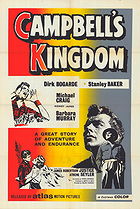 Posted : 12 years, 4 months ago on 4 February 2013 02:26
(A review of Campbell's Kingdom)
Posted : 12 years, 4 months ago on 4 February 2013 02:26
(A review of Campbell's Kingdom)Campbell's Kingdom is the kind of healthily budgeted outdoor drama that the Rank Organisation increasingly turned to in the 50s to compete with the Hollywood studios. Dirk Bogarde is the now unfortunately named Bruce Campbell, a terminally ill Englishman with six months to live and some land in Canada he's just inherited from his disgraced grandfather, who the locals blame for ruining the town when their investment in his dreams of an oil strike ended with his partner running off with their money. Eager to prove the old man right before his own time is up, Bogarde's already tight deadline is further threatened by Stanley Baker's plan to flood the valley when he completes the dam he's building with dodgy cement and using to virtually run the territory himself. On Bogarde's side are surveyor Michael Craig, hotel manager Barbara Murray and James Robertson Justice's drilling engineer, but Baker controls the cable car that's the only way up to the `Kingdom' and will pull any dirty trick he can think of to stop them...
Based on a Hammond Innes bestseller and from the producer and director of Bogarde's hugely successful Doctor films, Betty Box and Ralph Thomas, it's the kind of well-made but unchallenging studio picture that seems rather cosy these days, and probably did back in 1957 too, but that's part of its charm. It's pretty clichéd stuff, but enjoyable enough for all that as a star vehicle even if a fiercely competitive Baker is clearly going all out to steal the picture from its more reserved star and his large collection of lumberjack shirts. The Eastmancolor location photography of the striking Canadian locations (actually the Dolomites in Italy) is pretty impressive and there's a supporting cast filled with familiar faces from British films of the era like Sid James, John Laurie, Finlay Currie, George Murcell and Robert Brown. It's the kind of film that won't do much for younger viewers but still has more than enough nostalgic appeal for older ones to carry it over as a satisfyingly undemanding Saturday matinee.
Network's PAL UK DVD offers a decent but unexceptional transfer with the original trailer and three stills galleries as extras, but VCI's US Region A-locked Blu-ray clearly uses a more recent transfer that's gone through some extensive visible restoration, which is a bit of a mixed blessing. The definition and vivid colour are much improved - the reds on Stanley Baker's shorts are particularly vibrant - but while for the most part the DNR has been used with some restraint it does become noticeably problematic in one of the big setpieces an hour into the picture when it starts to cause some motion blur. It's never quite bad enough to be a disaster but, like a few slight judders in the picture here and there, it lets down an otherwise very impressive release. The British trailer is the disc's only extra, and just to add to the inconvenience there's a lengthy promo for VCI's other vintage British releases (curiously the only part of the disc that is region-free) that you can't skip or fast forward though.
Based on a Hammond Innes bestseller and from the producer and director of Bogarde's hugely successful Doctor films, Betty Box and Ralph Thomas, it's the kind of well-made but unchallenging studio picture that seems rather cosy these days, and probably did back in 1957 too, but that's part of its charm. It's pretty clichéd stuff, but enjoyable enough for all that as a star vehicle even if a fiercely competitive Baker is clearly going all out to steal the picture from its more reserved star and his large collection of lumberjack shirts. The Eastmancolor location photography of the striking Canadian locations (actually the Dolomites in Italy) is pretty impressive and there's a supporting cast filled with familiar faces from British films of the era like Sid James, John Laurie, Finlay Currie, George Murcell and Robert Brown. It's the kind of film that won't do much for younger viewers but still has more than enough nostalgic appeal for older ones to carry it over as a satisfyingly undemanding Saturday matinee.
Network's PAL UK DVD offers a decent but unexceptional transfer with the original trailer and three stills galleries as extras, but VCI's US Region A-locked Blu-ray clearly uses a more recent transfer that's gone through some extensive visible restoration, which is a bit of a mixed blessing. The definition and vivid colour are much improved - the reds on Stanley Baker's shorts are particularly vibrant - but while for the most part the DNR has been used with some restraint it does become noticeably problematic in one of the big setpieces an hour into the picture when it starts to cause some motion blur. It's never quite bad enough to be a disaster but, like a few slight judders in the picture here and there, it lets down an otherwise very impressive release. The British trailer is the disc's only extra, and just to add to the inconvenience there's a lengthy promo for VCI's other vintage British releases (curiously the only part of the disc that is region-free) that you can't skip or fast forward though.
 0 comments, Reply to this entry
0 comments, Reply to this entry
The Golden Child review
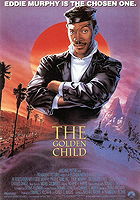 Posted : 12 years, 4 months ago on 4 February 2013 01:59
(A review of The Golden Child)
Posted : 12 years, 4 months ago on 4 February 2013 01:59
(A review of The Golden Child)A messy fantasy comedy thriller that just doesn't pay off
One of those hits that no-one seemed to have a good word for back in 1986, The Golden Child was the film that took the shine off Eddie Murphy after the huge success of Beverly Hills Cop and showed that quality control certainly wasn't high on his agenda. It may have been profitable, but the steep drop in takings implied that audiences were as unimpressed as critics with this messy fantasy comedy about a private eye trying to save a mystical Tibetan child from Charles Dance's shape-shifting demon. Clumsily rewritten from a Mel Gibson thriller to a lazy Eddie Murphy ego trip, the final screenplay as filmed is pretty poor, with a few elements hinting that it might once have been the makings of a more interesting film along the lines of Big Trouble in Little China, but it's desperately hobbled by not giving its star any real comic material to work with and either expecting him to adlib something on the day or simply assuming the audience liked him so much they wouldn't notice. Unfortunately Murphy clearly couldn't think of anything much to fill in the blanks either, leaving his character increasingly floundering, albeit not as badly as a spectacularly awful Charlotte Lewis, one of those flavor of the year British starlets who can't act to save their life. Since she can't fight either, she's also laughably obviously doubled in her martial arts scenes as well as, somewhat bizarrely, in a few shots of her walking, though tragically they never found a double for her acting who could do more than just the one blank expression.
There are just enough odd little moments like a semi-successful dream sequence (one of a couple of scenes to show the surviving traces of John Barry's almost entirely rejected score) or the occasional one liner that hits home to just about make it worth persevering with if you're grimly determined to make it to the end, but it really doesn't repay the effort. Still, you do get to see Randall Tex Cobb in white tux, top hat and Mongolian makeup as one of Dance's minions, which is something you don't see every day...
Paramount's DVD has an okay but unexceptional 1.78:1 widescreen print but a trailer is your lot for extras.
One of those hits that no-one seemed to have a good word for back in 1986, The Golden Child was the film that took the shine off Eddie Murphy after the huge success of Beverly Hills Cop and showed that quality control certainly wasn't high on his agenda. It may have been profitable, but the steep drop in takings implied that audiences were as unimpressed as critics with this messy fantasy comedy about a private eye trying to save a mystical Tibetan child from Charles Dance's shape-shifting demon. Clumsily rewritten from a Mel Gibson thriller to a lazy Eddie Murphy ego trip, the final screenplay as filmed is pretty poor, with a few elements hinting that it might once have been the makings of a more interesting film along the lines of Big Trouble in Little China, but it's desperately hobbled by not giving its star any real comic material to work with and either expecting him to adlib something on the day or simply assuming the audience liked him so much they wouldn't notice. Unfortunately Murphy clearly couldn't think of anything much to fill in the blanks either, leaving his character increasingly floundering, albeit not as badly as a spectacularly awful Charlotte Lewis, one of those flavor of the year British starlets who can't act to save their life. Since she can't fight either, she's also laughably obviously doubled in her martial arts scenes as well as, somewhat bizarrely, in a few shots of her walking, though tragically they never found a double for her acting who could do more than just the one blank expression.
There are just enough odd little moments like a semi-successful dream sequence (one of a couple of scenes to show the surviving traces of John Barry's almost entirely rejected score) or the occasional one liner that hits home to just about make it worth persevering with if you're grimly determined to make it to the end, but it really doesn't repay the effort. Still, you do get to see Randall Tex Cobb in white tux, top hat and Mongolian makeup as one of Dance's minions, which is something you don't see every day...
Paramount's DVD has an okay but unexceptional 1.78:1 widescreen print but a trailer is your lot for extras.
 0 comments, Reply to this entry
0 comments, Reply to this entry
Harlequin (1980) review
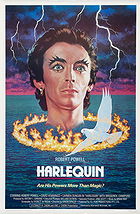 Posted : 12 years, 4 months ago on 4 February 2013 01:56
(A review of Harlequin (1980))
Posted : 12 years, 4 months ago on 4 February 2013 01:56
(A review of Harlequin (1980))One of those it-must-have-seemed-like-a-good-idea-at-the-time movies
Simon Wincer's Harlequin is one of those it-must-have-seemed-like-a-good-idea-at-the-time movies, transposing the Rasputin myth (rather than the reality) to 1980 Australia pretending to be America as Robert Powell's faith healer, magician and possible charlatan inveigles his way into senator David Hemmings household by curing his son of leukaemia. New age mumbo jumbo, passable but unimpressive special effects and 70s corporate political conspiracies converge to little effect, while a cheesy score by Brian May and a they're-not-really-going-to-oh-my-Lord-they-did ending bang the final nail in the coffin.
It doesn't help that the film's not been treated well on DVD in the UK: Prism's cropped release appears to be cut and is extras-free (the original deleted release by Britfilms was at least 2.35:1). The US releases, under the title Dark Forces [DVD] [1980] [Region 1] [US Import] [NTSC], fares better, with a 2.35:1 widescreen transfer, audio commentary with Director Simon Wincer and Producer Anthony I. Ginnane, isolated score, stills gallery and trailer.
Simon Wincer's Harlequin is one of those it-must-have-seemed-like-a-good-idea-at-the-time movies, transposing the Rasputin myth (rather than the reality) to 1980 Australia pretending to be America as Robert Powell's faith healer, magician and possible charlatan inveigles his way into senator David Hemmings household by curing his son of leukaemia. New age mumbo jumbo, passable but unimpressive special effects and 70s corporate political conspiracies converge to little effect, while a cheesy score by Brian May and a they're-not-really-going-to-oh-my-Lord-they-did ending bang the final nail in the coffin.
It doesn't help that the film's not been treated well on DVD in the UK: Prism's cropped release appears to be cut and is extras-free (the original deleted release by Britfilms was at least 2.35:1). The US releases, under the title Dark Forces [DVD] [1980] [Region 1] [US Import] [NTSC], fares better, with a 2.35:1 widescreen transfer, audio commentary with Director Simon Wincer and Producer Anthony I. Ginnane, isolated score, stills gallery and trailer.
 0 comments, Reply to this entry
0 comments, Reply to this entry
Robin Hardy's Tales of the Bleeding Obvious
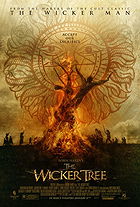 Posted : 12 years, 4 months ago on 4 February 2013 01:54
(A review of The Wicker Tree (2012))
Posted : 12 years, 4 months ago on 4 February 2013 01:54
(A review of The Wicker Tree (2012))With 2010's The Wicker Tree, the long discussed but not exactly awaited not-quite-sequel to The Wicker Man - Special Edition Director's Cut (2 disc set) [DVD] [1973], only the third film in his 39-year career as director, Robin Hardy shows some technical improvement over his more rough-and-ready work on The Wicker Man and the silly and dreary The Fantasist [1986] [DVD] but is hobbled by the fact that as a screenwriter he's no Anthony Shaffer even if he is still relentlessly ploughing the same furrow four decades on. Where Shaffer's Wicker Man screenplay had black wit to compliment its twists and unsettling setting, Hardy's a more obvious scribe telling a less interesting story that would struggle to fit a half hour episode of Tales of the Very Much As We Expected. This time instead of a Christian copper it's a pair of American evangelists, aw shucks cowboy for Christ Henry Garrett and born again Britney Spears-type Brittania Nicol, who are lured to a Scottish village as part of their mission to convert the godless heathen people of Scotland, and naturally the villagers have their own reasons for welcoming them. This time it's not just their crops that have failed: since an accident at the local Nuada nuclear power plant the population has been rendered infertile and some much-needed new blood is the solution...
Pitched as a `filme fantastique' rather than a horror film, it plays out more like an episode of Tales of the Bleeding Obvious en route to its now overfamiliar ending. Even if there had never been a Wicker Man this wouldn't have made much impact because, unfortunately, this time round there's surprisingly little weirdness, mystery or threat as it just ambles flatly along, rarely descending into awfulness but just as rarely threatening to rise above mediocrity. Despite the best efforts of Graham MacTavish in Ben Kingsley-lite mode, it sorely lacks a figure as commanding as Christopher Lee's Lord Sommerisle to lift its spirits (an ailing Lee was long scheduled to play the part until an injury ruled him out). Even Lee himself can't do much with his brief compensatory cameo as an `elderly gentleman' in a flashback scene, exchanging the blasphemous bon mots of the earlier film that wittily picked away at its examination of the nature of faith and sacrifice with bland dialogue that you've heard a million times before, half of them probably in a class room while you were staring out the window. Honeysuckle Weeks fills in the Britt Ekland-ish role this time, but her sex scene is played more for laughs than eroticism, complete with comedy mugging that wouldn't be out of place in a Robin Askwith film. Unsurprisingly laughs, intentional or otherwise, are in as short supply as surprises or chills.
On the plus side the film does a decent job of integrating Keith Easdale's folk songs into the film (with John Scott filling in the gaps in the underscore) and there's a hint of a good scene when the local laird dismisses environmentalists concerns about his power plant by pointing out how much deadlier the sun is or his admission that religious conviction is often driven by which faith best fits your current needs, but the film is pretty much a one-time-only viewing for hardcore fans of the original. Where The Wicker Man haunted many who saw it for decades, this one is probably best forgotten. Still, at least it doesn't have Nic Cage in a bear suit punching women and screaming about bees...
Unlike most Anchor Bay DVDs there are at least some extras - a 12-minute making of featurette made up of very rough and jerky footage that looks like it's been downloaded off the internet, 9 deleted scenes and a surprisingly effective trailer - as well as a decent 2.35:1 widescreen transfer.
Pitched as a `filme fantastique' rather than a horror film, it plays out more like an episode of Tales of the Bleeding Obvious en route to its now overfamiliar ending. Even if there had never been a Wicker Man this wouldn't have made much impact because, unfortunately, this time round there's surprisingly little weirdness, mystery or threat as it just ambles flatly along, rarely descending into awfulness but just as rarely threatening to rise above mediocrity. Despite the best efforts of Graham MacTavish in Ben Kingsley-lite mode, it sorely lacks a figure as commanding as Christopher Lee's Lord Sommerisle to lift its spirits (an ailing Lee was long scheduled to play the part until an injury ruled him out). Even Lee himself can't do much with his brief compensatory cameo as an `elderly gentleman' in a flashback scene, exchanging the blasphemous bon mots of the earlier film that wittily picked away at its examination of the nature of faith and sacrifice with bland dialogue that you've heard a million times before, half of them probably in a class room while you were staring out the window. Honeysuckle Weeks fills in the Britt Ekland-ish role this time, but her sex scene is played more for laughs than eroticism, complete with comedy mugging that wouldn't be out of place in a Robin Askwith film. Unsurprisingly laughs, intentional or otherwise, are in as short supply as surprises or chills.
On the plus side the film does a decent job of integrating Keith Easdale's folk songs into the film (with John Scott filling in the gaps in the underscore) and there's a hint of a good scene when the local laird dismisses environmentalists concerns about his power plant by pointing out how much deadlier the sun is or his admission that religious conviction is often driven by which faith best fits your current needs, but the film is pretty much a one-time-only viewing for hardcore fans of the original. Where The Wicker Man haunted many who saw it for decades, this one is probably best forgotten. Still, at least it doesn't have Nic Cage in a bear suit punching women and screaming about bees...
Unlike most Anchor Bay DVDs there are at least some extras - a 12-minute making of featurette made up of very rough and jerky footage that looks like it's been downloaded off the internet, 9 deleted scenes and a surprisingly effective trailer - as well as a decent 2.35:1 widescreen transfer.
 0 comments, Reply to this entry
0 comments, Reply to this entry
 Login
Login
 Home
Home 100 Reviews
100 Reviews Collections
Collections